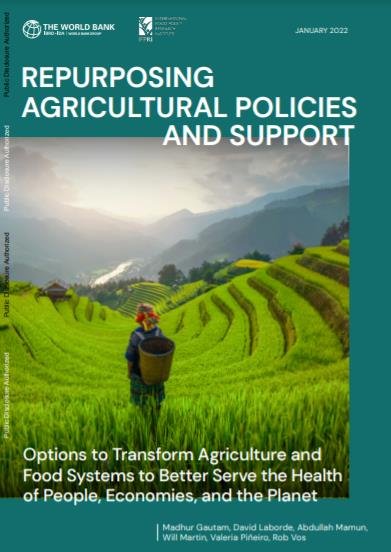- Share this article
- Subscribe to our newsletter
Repurposing Agricultural Policies and Support
The report Repurposing Agricultural Policies and Support: Options to Transform Agriculture and Food Systems to Better Serve the Health of People, Economies, and the Planet was published by the World Bank and the International Food Policy Research Institute (IFPRI) in January 2022.
It reveals that investing in climate-smart innovations that both increase agricultural productivity and reduce greenhouse gas emissions could lower overall emissions from agriculture by more than 40 per cent, restore 105 million hectares of agricultural land to natural habitats and cut the cost of healthy foods, thereby also contributing to better nutritional outcomes. To achieve this, the authors call for concerted action, including support to low- and middle-income countries that are facing fiscal constraints to enable them to review current policies and prioritise green investments.
Under a “business-as-usual” scenario, the report estimates that greenhouse gas emissions from agricultural production will double by 2040, with 56 million hectares of new land being used for agriculture between 2020 and 2040. However, there are important trade-offs for policymakers to consider as they seek to reform agricultural support policies and achieve better outcomes.
For example, the report finds that simply eliminating support would lower farm output and increase poverty while generating only modest climate gains. Making support conditional on more environmentally friendly but lower-yielding production methods can generate climate benefits, but would increase food prices and poverty, while expanding agricultural land use.
The most effective repurposing, therefore, requires policy incentives and public investment in technologies that both reduce emissions and enhance productivity in order to meet the growing demand for food and ensure food security. These technologies include feed supplements that reduce livestock emissions while increasing productivity, and rice production systems that use less water and produce less methane without compromising farmers’ incomes and yields.
(World Bank/ile)
Read more and download the report at World Bank website.





Add a comment
Be the First to Comment